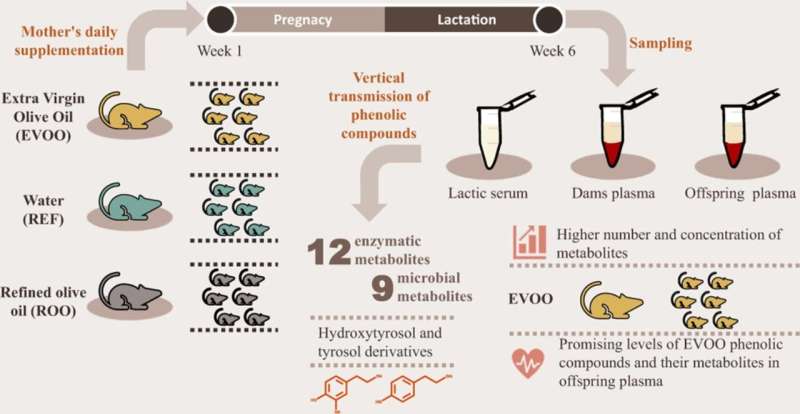Consumption of extra virgin olive oil during pregnancy increases the level of antioxidants in breast milk and in infants

The consumption of extra virgin olive oil (EVOO)—a product with widely known benefits for our health—increases the level of phenolic compounds in breast milk and can cross the placental barrier, reaching the descendant. This has been stated in a study carried out by a team of the Faculty of Pharmacy and Food Sciences of the University of Barcelona, the Institute for Research on Nutrition and Food Safety (INSA-UB) and the Physiopathology of Obesity and Nutrition Networking Biomedical Research Center (CIBEROBN). The results of the article, conducted on rats as study models, have been published in the journal Food Chemistry.
The conclusions support the fact that diets enriched with EVOO can modify or even increase the content of these bioactive compounds in breast milk with potential benefits for the infant's health. The study is led by the experts Maria J. Rodríguez-Lagunas and Anna Vallverdú-Queralt and it is part of a program of Internal Research Promotion (FRI) among young researchers of INSA-UB.
This competitive call, aimed at boosting the collaboration between different research groups of this institute, aims to promote the development of original and innovative research projects and it wants to promote young researchers to become project principal researchers.
Transmission of phenolic compounds
Breast milk is the best nutrition source for the infants since it contains essential nutrients and bioactive factors (hormones, antibodies, microorganism, stem cells, etc.). Moreover, it provides many short- and long-term benefits to the mother and the infant, and regarding the latter, it reduces the incidence of infections and the risk of suffering from metabolic diseases in the future.
EVOO represents the main source of fat in the Mediterranean diet, but to date, the fact that the phenolic compounds of this product can be a compound in breast milk and be available in infants was still unknown. As part of this preclinical study, the team discovered this fact after the analysis to assess qualitatively and quantitatively the levels of phenolic compounds and their derivates in biological samples in the pregnant animal and the offspring after six weeks of a daily intake of EVOO.
The results of the research showed that the phenolic compounds coming from the diet—specifically those from EVOO—reach the systemic circulation of mothers. Furthermore, they detected many phenolic compounds and derivates in breast milk. Surprisingly, it is noteworthy that some of the phenolic compounds and their metabolites were detected in higher concentrations in the offspring plasma than in the mothers' plasma.
"To date, several studies had described that the composition of breast milk can be affected by biological and environmental factors to which the mother is exposed, such as the mother's diet. Therefore, the nutritional interventions during pregnancy and the breastfeeding period can have an impact on the quality of breast milk, and consequently, on the infant's health. Therefore, our findings shed light on the importance of the mother's diet during pregnancy and lactation, and they provide the base for future studies on the impact of phenolic compounds on the mother's and the infant's health," the authors write.
More information: Anallely López-Yerena et al, Nutrition during pregnancy and lactation: New evidence for the vertical transmission of extra virgin olive oil phenolic compounds in rats, Food Chemistry (2022). DOI: 10.1016/j.foodchem.2022.133211


















